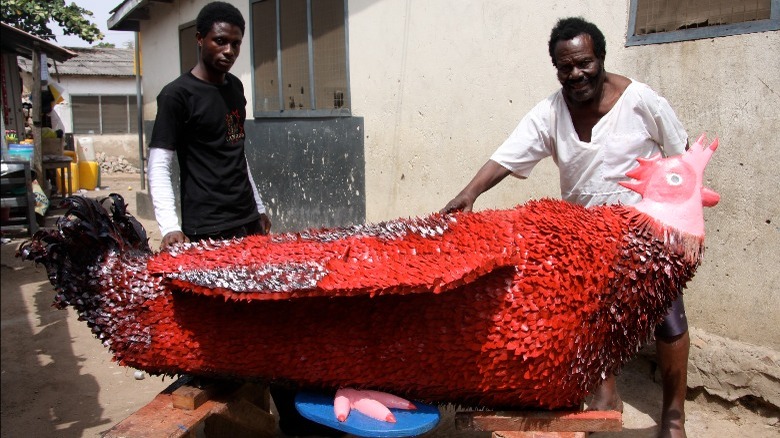Things People Do In Other Countries That Confuse Everyone
In the last couple decades, the internet has given us crazy levels of access to the lives of people in totally different cultures. While it was a big adventure for your great-great-grandpa to once meet a real, actual guy from two towns over, you can now go online and watch people performing native dances in Tahiti, then maybe have an AMA with them afterward. In such an interconnected world, who's to judge what's weird and what's not?
Well, that's one way of looking at it. The other is that we're just now all discovering how freakish the rest of us really are. The dream of one-planet harmony has been replaced by the acid visions of one-planet lunacy. Across the Earth, Swedes are starting to look askance at Finns, while Canadians watch Americans in bafflement, Mexicans scratch their heads over Guatemalans, and everyone wonders what the heck Japan is on. The result is a world where we all think everyone else is nuts. The thing is, we're all right.
The Church of England maintains official exorcists
"Who ya gonna call?" If you're living in England, the answer ain't "either Bill Murray or Kristen Wiig, depending on franchise preference!" It's something initially much less fun-sounding, but ultimately almost as interesting. You gonna call your local deliverance minister. They're the person your diocese officially maintains for the soul (geddit?) purpose of ghostbusting.
According to the Telegraph, the Church of England appoints at least one official exorcist in each of Britain's 42 Anglican dioceses, and they function like a kind of supernatural secret service. When parishioners have an encounter with the British equivalent of Slimer, the local deliverance minister is empowered to launch an investigation. Usually, this means tracking the source of the supernatural occurrence, maybe to alleged poltergeist activity or a memory echo from the past, or anything else that sounds suspiciously unscientific. Very occasionally, it means getting involved in a straight-up exorcism, although no one calls it that because Catholicism nabbed it first.
Non-believers may be starting to worry about the effect these exorcists-by-another-name are having on the mental health of Britain. Well, fear not. The whole thing is less Exorcist sequel than it sounds, and surprisingly skeptical. Deliverance ministers are required to go through rigorous training on mental health disorders to stop them from accidentally exorcising someone they should be taking to the doctor. The Telegraph even claims some Bishops deliberately appoint skeptics to avoid dealing with the PR disaster of an exorcism gone wrong.
Japan charges hostages kidnapped abroad for their return flights
Getting taken hostage abroad has to be one of the most harrowing things that can happen to a person. Know what would be even worse? Being freed from your hostage drama to discover your countrymen thought you were an idiot and that you had a bill for $7,000 waiting for you back home. Well, that's about what will happen if you're a Japanese citizen. Over the years, the government in Tokyo has set a precedent for charging kidnapped citizens for their return flights, then publicly telling their fellow Japanese to shun them (via NBC).
This practice came to international attention in 2004, when two Japanese aid workers and a photojournalist were kidnapped in Iraq. While things could have gone much worse (the militants threatened to burn them alive), they also could've gone a whole lot better. After Islamic leaders petitioned for their release, the hostages were flown back to Japan ... where they were shunned by the public and billed for their return flights, medical expenses, and wasting government time. One Japanese psychiatrist quoted by NBC said the shame of returning to a hostile Japan made the whole hostage experience even more stressful than for most people (which is to say, really stressful).
Similar scenes were seen over ten years later, when Haruna Yukawa was taken hostage by ISIS. Japanese media and the public felt little sympathy for him, prior to his very public, very brutal execution (via The Guardian).
Most Finnish companies have an in-house sauna for you to get naked in
On a list of "nightmares most likely to give your shrink nightmares," getting naked in front of work colleagues probably ranks right up there with accidentally killing your father and marrying your mother. Well, call your psychiatrist and tell them to make space in their diary because there's a whole country where workplace nudity is actively encouraged. Finland has the most saunas per capita of anywhere on Earth, with one freaky hot burn-cabin for every two people. Finnish employees are even expected to join their boss in the company sauna for some naked time.
The BBC has covered this, and the story makes ... peculiar reading to any non-Finns. If you're working for a Finnish company, you will probably join your colleagues naked in the sauna for a few hours a week. You will probably have naked beers with them, refreshing your skin in the cold air between sauna dives. If you're lucky, you might even get invited to one of Helsinki's exclusive sauna clubs, where you will have the chance of seeing anyone from your government representative to the evening news weatherman strutting in the buff, their shriveled junk dangling for all to see.
That last sentence, by the way, highlights a problem with Finland's workplace sauna culture. Despite generally being an equal society, mixed saunas are not a thing. That means that, if you're female and working in a company where all the top brass are male, you're effectively getting locked out of meetings and backside-kissing opportunities every week.
In parts of Indonesia they invite their dead relatives to lunch
The creepiest part of Alfred Hitchcock's Psycho comes at the end, when (really old spoiler alert!) we discover Norman Bates' dead mother festering in the basement. There's one part of the world where that scene would elicit not a scream of terror, but maybe a warm sigh of recognition. Among the Torajan people of Indonesia, the death of a relative isn't a barrier to spending quality time with them. Rather than bury their dead, they dress them up, take them for walks, give them a room in the house, and even invite them for lunch.
The Guardian has a photo-heavy article that's both borderline NSFW and utterly fascinating. For the Torajan, death is a process that takes years, sometimes even decades. After your loved ones die, you just carry on as before, except now you have to dress them each morning and "feed" them yourself. Over several years, you save up for a proper burial and finally inter them, but it's still not over! From that point, you're expected to regularly exhume your half-mummified grandpa, clean him, dress him in new clothes, and maybe spray him with insecticide to keep the bugs away. The Guardian article features one family still cleaning a woman 35 years after she died.
The creepiest part for non-Torajan eyes might be the yearly ritual whereby dead relatives are taken for walks around the villages. Some corpses are even given cigarettes to "smoke."
Japanese people knock down their houses every time they move
A general rule of thumb in most countries is that buying a house is a sound investment. If you live somewhere like Britain, it's practically guaranteed to increase in value, provided you don't turn the bedroom into a private sex dungeon. Japan, as everyone knows, isn't most countries, and that extends to the housing market. Japanese homes don't just depreciate in value. They become so worthless that it's standard practice to knock them down every time you move (via The Guardian).
Here are some figures. In 2011, the average American home was around 35 years old. In the U.K., a 2008 study estimated one-fifth of all houses were built before 1919 (PDF). In Japan, almost no houses reach 30 years old. They typically become completely worthless after only 20 years. That means there are houses built in 1997 that are about to become worth more as scrap than as actual houses. In America, a '97 home is still new. In historic Europe, it's so new that the owners are practically still scraping the styrofoam off.
The issue is that Japan lost most of its old houses to firebombing in World War II. After the war, new living units needed to be built quickly to rehouse civilians. They were built using cheap materials, and somehow that style stuck. Add to that repeatedly revised earthquake codes, such as after the 2011 earthquake/tsunami that killed nearly 20,000 people, and this build 'em quick, knock 'em down attitude almost starts to make sense.
Czechs traumatize their kids for Christmas
Your earliest memories of Christmas probably involve things like presents, Santa, and your visiting uncle getting blind drunk and passing out at 3 p.m. Unless you're from the Czech Republic, in which case they probably involve tears and horrific trauma. Like a lot of Central European states, the Czech Republic has both a Santa figure and a devil figure that accompanies him. But while the Austrian and German devil Krampus exists as part of an ancient pagan ritual, the Czech version has a more prosaic raison d'etre: to scare the jeepers outta kids.
According to some English-language Czech blogs, a visit from čert (devil) is the earliest traumatic memory of many children. Every December 5, teens and adults dress up as angels, devils, and St Mikuláš (the Czech version of St. Nick), and go out on the streets to either hand out candy or frighten children into behaving. In cities, this traditionally takes place in public squares (as pictured above). In small villages, Mikuláš and čert are more likely to go from door to door, threatening to throw bad kids in their sack and take them away to Hell. (As someone who lives in the country, this author can confirm these village devils often really, really enjoy terrifying the kids.)
Still, it's not all bad. As other Czech-based blogs like to point out, most of the children kinda enjoy being scared. And a meeting with čert is like starring in your own private horror movie.
Some Ghanaians bury their dead in coffins that look like movie props
The Ga people of southeast Ghana have taken the somber sadness of death and turned it into an explosion of color and style rarely found outside an ostentatious pimp suit. In the postwar period, local artists like Ataa Oko and Kane Kwei apparently got bored with the dreary sameness of coffins, so they decided to create one that would ensure the afterlife was a nonstop party. In 1950, the first figurative coffin debuted, shaped like an airliner. Fast-forward to today, and Ghanaians are getting buried in coffins that look like movie props.
At io9 you can find both the story and the pictures, and they're glorious and bonkers in equal measure. Over the years, coffins have been crafted that look like giant sneakers, golden eagles, Nikon cameras, classic cars, cell phones, and even bottles of beer. The most prolific maker is Paa Joe, a guy The Guardian credits with "[putting] the fun in funeral," but his rivals are equally impressive. Kudjoe Affutu once created a scale replica of the Pompidou Center for burying people in.
Traditionally, the fantasy coffins are shaped in a way that reflects the life of the person, which can lead to some interesting guessing games when trawling through pictures on the internet. While some are now created specially for display in museums, the vast majority still wind up 6 feet under. From this it's possible to conclude two things. One, that future archaeologists are gonna be very confused, and, two, that Ghanaian vampires have awesome homes.
Spain legally requires husbands to do housework
It sounds like the plot of a 1950s sitcom. The dang guv'ment passes a law forcing all men in the country to do household chores, with hilarious consequences as the nation's red-blooded males grapple with such impossible tasks as "washing the dishes" and "folding clean linen." Sadly for any time-traveling network executives charmed by that pitch, this storyline has already been done by real life. In 2005, as The Guardian reported, Spain passed a law requiring husbands to do more housework.
The new law was part of a sweeping change to the civil marriage contract and, boy, was it ever necessary. At the time it went into effect, Spanish men were spending a combined 96 minutes a day on childcare and housework. Their long-suffering wives, by contrast, were spending 6 hours. One contemporary BBC article reported that half of Spanish men did no housework at all. Thanks to the 2005 law, a lack of housework on the guy's part can now affect the terms of a divorce.
Madrid has form with these kinds of laws. In 2014, MPs put forward a draft bill that would have legally required children to take part in household chores. While there's no evidence it ever went into effect, the fact it could still be suggested shows just how tightly Spain wants to regulate people's home lives. Hear that? That's the sound of a billion libertarians, crying out at once in terror.
China has insanely brutal boot camps for internet addicts
It's still an unsettled question as to whether internet addiction is a real thing or not. The Diagnostic and Statistical Manual of Mental Disorders doesn't list it, for one. In China, though, the question is as settled as the question of whether alcohol is addictive, or whether bears like to relieve themselves in wooded areas. Since 2008, Beijing has recognized internet addiction as a serious disorder. Nine years later, and the Middle Kingdom is trying to cure its addicted kids by hurling them into brutal boot camps (via The Guardian).
Some of these camps are similar to American weight loss camps, all focused on activities and teamwork and achieving goals. Others seem to have been modeled on Russia's gulag system. One camp was caught using electroconvulsive therapy on kids. Others have been caught throwing teenagers into solitary confinement, locking them in cells, and even beating them with all the gusto of a North Korean prison guard trying desperately to prove his loyalty. One camp reported in the Washington Post effectively kidnapped teenagers and forced them to overcome their addiction by doing stuff like cleaning out blocked toilets with their bare hands.
Then there are the marches. Even the nicer camps send their kids out on grueling, 180-mile (300 km) hikes in temperatures hitting 104 degrees Fahrenheit (40° C). A stay in these places can last a whole year and, needless to say, there's no internet or smartphones. You know what they say, whatever doesn't kill you will only kill you later.







